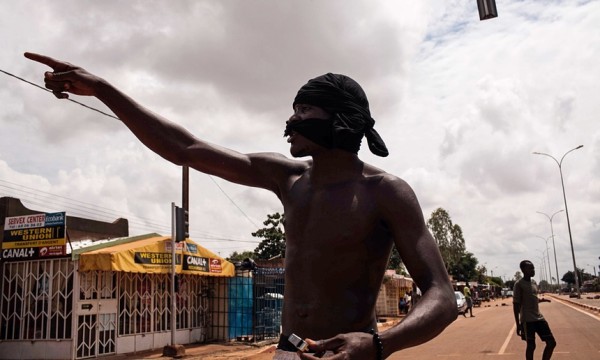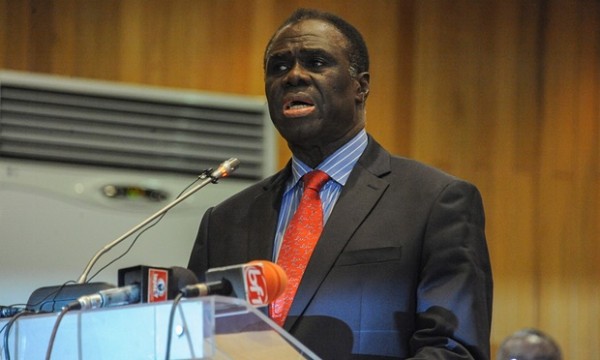PBS: Escaping Eritrea … [Read More...] about ካብ ውሽጢ ቤት ማእሰርታት ኤርትራ
The rise and fall of Burkina Faso’s coup: what you need to know
Rakotomalala and Nadia Karoui, Thursday 24 September 2015, The Guardian
A seizure of power threatened to derail forthcoming elections, but a swift intervention from regional heads of state seems to have restored order – for now. Global Voices online reports
A coup in Burkina Faso threatened to pull the country further into political crisis, with leading ministers detained, violent clashes on the streets of the capital, and a wide-eyed general installed overnight as head of state.
But a swift intervention from west African countries including Senegal, Benin, and headed by Nigerian president Muhammadu Buhari, has restored the country to order in an unprecedented – and peaceful – turnaround.
The country was plunged into crisis a week ago when the powerful presidential guard detained the interim leaders – who had been in charge since a popular uprising deposed the iron-fisted president Blaise Compaoré last October after his failed bid to extend his 27-year rule.

Members of the Regiment of Presidential Security (RSP) detained Michel Kafando and his prime minister Isaac Zida for more than two days, naming General Gilbert Diendéré, longtime aid to Compaoré, as the new leader of the country.
But on Wednesday, Kafando was returned to power after emergency talks with the Economic Community of West African States (Ecowas), led by new Nigerian president Muhammadu Buhari.
“The transition has been restored and this very minute I am resuming the exercise of power,” Kafando, said in an announcement on Wednesday.
The move came after marathon talks in Abuja, and threats by the French president, François Hollande, that the coup leaders should surrender immediately or face the “consequences”.
Who were the coup leaders?
The Regiment of Presidential Security (RSP) is a branch of Burkina Faso’s military in charge of protecting the president, its institutions and any person designated by the president of Burkina Faso. The RSP was created by Compaoré as a way to assert authority after the assassination of Thomas Sankara, Compaoré’s predecessor and beloved popular leader.
A force 1,200 men strong, the RSP is known amongst the Burkinabé people for its substantial weaponry, and its autonomy from any other armed force, since it exclusively operates under the president’s command.
Thomas Sankara was the charismatic leader of Burkina Faso from 1983 to 1987, loved for his anti-colonialist and pan-Africanist policies. He was overthrown in a coup led by Compaoré in 1987 and assassinated shortly after, though it remains unclear whether Compoaré was directly involved in the killing. A principal figure in the RSP, Diendéré was also actively involved in the coup that deposed Sankara.
What does this have to do with the upcoming elections?
The presidential and legislative elections were supposed to take place in Burkina Faso on 11 October. But in an interview with Jeune Afrique, Diendéré justified his takeover by claiming the RSP “decided to take action to prevent the disruption of Burkina Faso due to the insecurity looming during pre-elections.” However, critics have suggested this is merely justification for the group to take power and to reestablish the preceding regime by force.

Furthermore, the autopsy results expected to shed light on Sankara’s assassination were supposed to be published on 17 September, the day of the coup. The autopsy has taken 30 years to come to fruition because the Burkina administration under Compaoré refused to allow an independent committee access to the body. The autopsy results are still held secret as of today leading many to speculate that the RSP don’t want to result to be made public for fear or incriminating Compaoré or Diendéré.
The overnight deal to restore the interim administration to power was signed after troops entered Ouagadougou, turning up the pressure on the elite RSP who staged the coup. Under its terms, the RSP agreed to stand down from the positions they had taken up in Ouagadougou, while the army also agreed to withdraw its troops and guarantee the safety of the RSP members as well as their families.
Did the citizen resistance make a difference?
The Balai Citoyen movement, initiated by Burkina Faso’s youth, was an important element in last year’s 30 October popular upheaval which toppled Compaoré. On that day, tens of thousands of demonstrators took to the streets of capital and other big villages, headed for the authorities’ headquarters and demanding that Compaoré should obey the constitutional term limits and cede power.
The hashtag #lwili (meaning “little bird” in Mooré, the most widely spoken language of Burkina Faso), was created to share the latest news updates on the crisis as well as promote various citizen’s initiatives.
On announcing the coup on 16 September, spontaneous opposition demonstrations once again took place in the streets of the capital. A radio station, Radio de la Résistance Citoyenne (Citizen’s Resistance Radio), was set up to call on activists to take action against the RSP’s attempt to take power.
Now that the interim leaders have been restored to power, Kafanda has promised the government will “take into account the will of the Burkinabé people” in the next steps, ahead of the general election.
There were signs that people on the streets are furious at the suggestion of an amnesty for the coup ringleaders. It was unclear early on Wednesday if the amnesty had made it into the deal signed between the coup leaders and the army.
